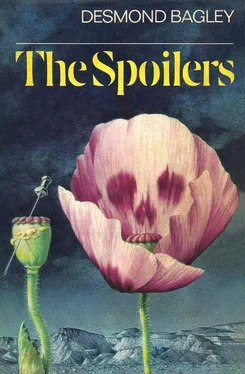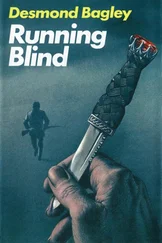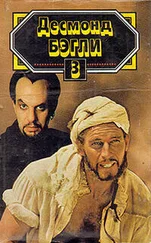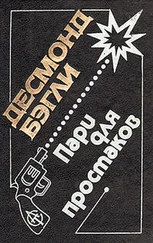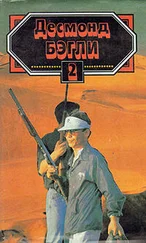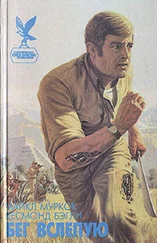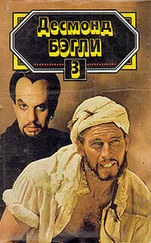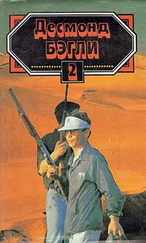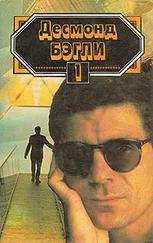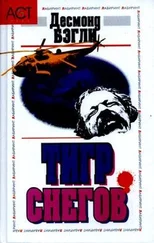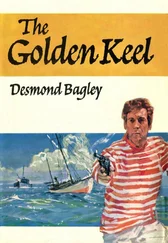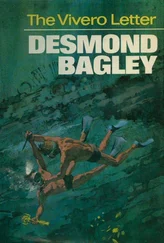Abbot thought of the torpedo somewhere below and behind them if Parker was right. Although he had seen it stripped down, it was hard to realize that it was down there driving through the water undeviatingly at this speed. He looked forward at the broad shoulders of the man at the wheel and saw the muscles of his arms and back writhe as he fought to keep the boat on a straight course and that gave him some inkling of Parker’s achievement — one half inch error in a hundred yards for mile after mile after mile.
They passed another circling boat and again bounced over its wake to leave it behind. Eastman looked at his watch. ‘Another ten minutes,’ he shouted and grinned at Parker. ‘We’ve come ten miles — five to go.’
Parker nodded vigorously. ‘Ease a knot off the speed if you can — we don’t want to overrun her too much.’
Eastman turned and spoke into the helmsman’s ear and the roar of the engines altered the slightest fraction. To Abbot it did not seem to make any difference to the speed; the wake streamed away behind them just as quickly in a line so straight it seemed to be ruled on the blue water. He was beginning to feel sicker; the noise was deafening and the motion upset his stomach, and he knew that if they did not stop soon he would vomit over the side. If this was watersport it was not for him.
Presently Jeanette spoke for the first time. She stood up and pointed. ‘Stella del Mare. ’
Abbot felt relieved — his ordeal was almost at an end. Parker twisted round and looked at the yacht, then beckoned to Eastman. ‘Don’t stop here. Run straight past on the same course. We want the torpedo, not the bloody yacht.’
Eastman nodded and spoke to the helmsman again, and they tore past the Stella del Mare and there was nothing ahead but the bouncing horizon. Parker shouted, ‘Everyone look astern — you’ll see her with her nose in the air like a bloody great pole stickin’ out o’ the sea, an’ there’ll be a light an’ a bit o’ smoke.’
Everyone looked but there was nothing but the Stella del Mare receding into the distance, and Abbot felt depressed as the minutes ticked by. He looked at his watch and noted that it had been thirty-three minutes since they had begun this mad dash across the Mediterranean. He did a mental calculation and figured they had come at least sixteen miles and possibly more. What could have gone wrong?
He remembered what Parker had said about setting the torpedo to run at a depth of twelve feet from a launch of six feet. Parker had been worried about porpoising, but what if the torpedo had just carried on down into the depths of the sea? From what Parker had previously told him, if the torpedo got much below sixty feet the pressure would damage it beyond repair and it would never be seen again.
He looked at Jeanette whose expression had never changed. What would she do about it? He could guess the answer would be violent. Parker was staring aft with a tense look on his face. His grin was gone and the crowsfeet around his eyes were etched deeper.
Thirty-four minutes — and nothing. Thirty-five minutes — and nothing. Abbot tried to catch Parker’s eye, but Parker had attention only for the sea. It’s a bust, decided Abbot in desperation.
Suddenly Parker was convulsed into movement. ‘Thar she blows!’ he yelled excitedly. ‘On the starboard quarter. Cut these bloody engines.’
Abbot looked over the sea and was thankful to hear the engines die. Away in the distance bobbed the torpedo, just as Parker had described it, and a smoky yellow flame burned dimly in the strong sunlight. The boat turned and headed towards it while Parker literally danced a jig. ‘Where’s a boat-hook?’ he demanded. ‘We have to secure her.’
‘What’s that flame?’ asked Eastman.
‘The Holmes light,’ said Parker. ‘It’s powered by sodium — the wetter it gets the hotter it burns.’
‘A neat trick,’ commented Eastman.
Parker turned to him and said solemnly, ‘That torpedo bein’ there at all is an even neater trick. I reckon she did eighteen miles an’ that’s not just a trick — it’s a bloody miracle. Are you satisfied wi’ it?’
Eastman grinned and looked at Jeanette. ‘I guess we are.’
‘We’ll be expecting your cheque,’ said Abbot to Jeanette.
She smiled at him brilliantly. ‘I’ll get it from Youssif as soon as we get back to the yacht.’
They went back to Beirut in the Stella del Mare, leaving the Orestes to pick up the torpedo from the launch to which it was secured, with Parker vowing eternal vengeance on anyone who was so ham-fisted as to damage it in the process. In the luxurious saloon Eastman broke open the cocktail cabinet. ‘I guess we all need a drink.’
Abbot dropped limply into a chair. For once Eastman had expressed exactly his own feelings. In the last hour he had gone through enough emotions to last a man a lifetime and a stiff drink would go down well. It turned into a convivial party — Eastman was jovial, Parker was drunk on success and needed no liquor to buoy him up, Jeanette was gay and sparkling, and even Youssif Fuad unbent enough to allow a fugitive smile to chase quickly across his face. Abbot was merely thankful.
Jeanette clicked her fingers at Fuad who took a folded piece of paper from his pocket and gave it to her. She passed it to Abbot. ‘The first instalment, Mike. There’ll be more to come.’
He unfolded the cheque and saw that it was drawn on Fuad’s own bank for $100,000 American, and wondered what would happen if he attempted to draw it before the final run of the torpedo off the American coast. But he did not comment on it — he was not supposed to know Fuad was a banker. ‘I wish us many more,’ he said.
Eastman raised his glass. ‘To the best goddam mechanic it’s been my fortune to meet.’
They drank to Parker, who actually blushed. ‘It’s too bad they don’t have torpedo races,’ said Eastman. ‘You’d never be out of a job, Dan. I’ve not seen anything so exciting since I was at Hialeah.’ He smiled at Jeanette. ‘But I guess there’s a lot more riding on this than I ever had on a horse race.’
Parker said, ‘That’s just the first bit — now we run into more problems.’
Jeanette leaned forward. ‘What problems?’ she asked sharply.
Parker swished his drink around in his glass. ‘Normally a Mark XI torpedo has a short range — a bit over three miles. Anythin’ you shoot at you can see, an’ any damn’ fool can see a ship three miles away. But you’re different — you want to shoot at somethin’ that’s clear over the horizon. You saw the distance we just travelled.’
‘That shouldn’t be much trouble,’ said Eastman. ‘Not if you have a good navigator who knows where he is.’
‘The best navigator in the world can’t tell his position to a quarter-mile in the open sea,’ said Parker flatly. ‘Not without an inertial guidance system which you couldn’t afford even if the Navy would sell you one. You can’t buy those on the war surplus market.’
‘So what’s the answer?’ asked Jeanette.
‘That big derrick on the Orestes is about fifty feet above the water,’ said Parker. ‘If you put a man up there in a sort o’ crow’s nest he could see a shade over eight miles to the horizon. What you’ve got to do is to put up a light on shore about the same height or higher, an’ if it’s bright enough it’ll be seen sixteen miles or more out at sea by the chap in the crow’s nest. But it needs to be done at night.’
‘It’s going to be a night job, anyway,’ said Eastman.
Parker nodded. ‘It needs polishin’ up a bit, but that’s the general idea.’ He paused. ‘There might be a few lights along the coast so you’ll need to have some way of identifying the right one. You could have a special colour or, better still, put a switch in the circuit an’ flash a code. The man in the crow’s nest on the Orestes should have a telescope — one o’ those things target shooters use would do, an’ it should be rigidly fixed like a sort o’ telescopic sight. As soon as he sees the light through it he presses the tit an’ away goes the torpedo. An’ it might help if he’s on intercom wi’ the helmsman.’
Читать дальше
